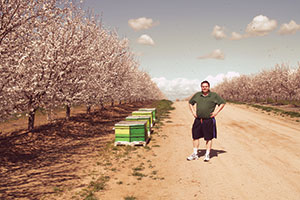Home Is Where the Hive Is
As the country’s honeybees face decimation, alumnus Jeffrey Lee (’90) has stepped up to save them
Most of us recall being college freshmen, and we can relate to a twinge of homesickness and to some small comfort we longed for to remind us of home. But how many of us missed our bees?
Unlike most of us, Jeffrey Lee was never afraid of the stinger-wielding insects. As a boy he roamed his neighborhood looking for bumblebees’ nests, marking the flitting, feisty creatures with Liquid Paper in an effort to take a census of the population. At age 13, his parents allowed him to order two honeybee hives from a beekeeper in California, and he soon had about 100,000 bees in his suburban backyard. His apiary grew over the years, and when he arrived at Pepperdine, Lee longed for the company of his honeybees. With the help of natural science professor Stephen Davis (who still recalls the freshman’s enthusiasm), he bought some hives from a beekeeper in the Conejo Valley just 20 miles north of campus and set up shop near the law school in the Malibu hills.
“Once I was able to get bees on campus, it really felt like home again,” he muses.
Lee’s fascination with entomology led to his study of organic chemistry at Pepperdine and later at Duke University. Why chemistry? According to Lee, it’s critical to his success as a beekeeper, in part, because “bees communicate chemically through the use of pheromones,” he explains.
Lee continued to keep honeybees as a hobby while earning his PhD in North Carolina and during a stint as an organic chemist in the pharmaceutical industry. Although the widely reported collapse of the bee population was about five years off, Lee was aware that honeybee numbers were declining, and he decided that his passion could no longer serve as a pastime. Saving the bees was too important to do on a part-time basis.
 A number of factors have contributed to the decimation of the country’s honeybees
since 2010, but Lee points specifically to two causes. A massive infestation of nonnative
varroa mites, parasites that pierce the honeybees’ exoskeletons and pass on viruses
and bacteria, is a major contributor. A second factor in the collapse of the country’s
honeybee colonies is the commercial use of pesticides. One class of insecticide is
particularly insidious, as it not only kills bugs that feed on treated plants, but
it also leaches into the groundwater and is incorporated into the surrounding wildflowers,
which in turn poison the bees that feed on them.
A number of factors have contributed to the decimation of the country’s honeybees
since 2010, but Lee points specifically to two causes. A massive infestation of nonnative
varroa mites, parasites that pierce the honeybees’ exoskeletons and pass on viruses
and bacteria, is a major contributor. A second factor in the collapse of the country’s
honeybee colonies is the commercial use of pesticides. One class of insecticide is
particularly insidious, as it not only kills bugs that feed on treated plants, but
it also leaches into the groundwater and is incorporated into the surrounding wildflowers,
which in turn poison the bees that feed on them.
It’s no exaggeration to say that honeybees are crucial to life as we know it. Lee points out that nearly all the fruits and vegetables grown in this country—from almonds and berries to cucumbers and melons—are dependent on pollination by honeybees. Bees are also responsible for pollinating the alfalfa and clover that feed our livestock. Without honeybees, the entire food supply of both humans and wildlife would be seriously compromised. Lee notes that scientists’ efforts to propagate crops in other ways, such as developing self-pollinating plants, can’t begin to match the pollinating power of a colony of 50,000 honeybees.
With the demise of virtually all wild honeybees in the US, and so few successful bee farmers in business today, Lee’s 2,000 hives play a small but significant role in maintaining the overall bee population and in producing the food we eat. Lee’s bees travel each February to California to pollinate the almond crop and later in the year they spread the pollen of blueberries in Maine and in Lee’s home state of North Carolina. Accordingly, it’s critical that he keep his bees as healthy as possible. He uses organic chemicals to keep the mites away from his bee families and feeds them protein supplements and multivitamins to vary their diet and keep them strong. To further ensure success, he maintains a number of different bloodlines in his operation; a virus that destroys one race may not have a great impact on another.
The future of the honeybee is precarious, but Lee has hope. He says that scientists are working to develop more resistant bees for breeding, and research in bee health has expanded greatly. Interest in beekeeping has grown in recent years too.
“I was keeping bees before it was cool,” he quips.
His commitment to ensure that honeybees survive and continue to serve their vital role to life on the planet is palpable. In order to accommodate our conversation, Lee had to take a break from treating his bees for parasites—at 10 PM on a Monday evening. For Lee, maintaining healthy, productive bee colonies is a round the clock responsibility—a small price to pay by the young man who, a long way from home for the first time, found comfort in their company.
